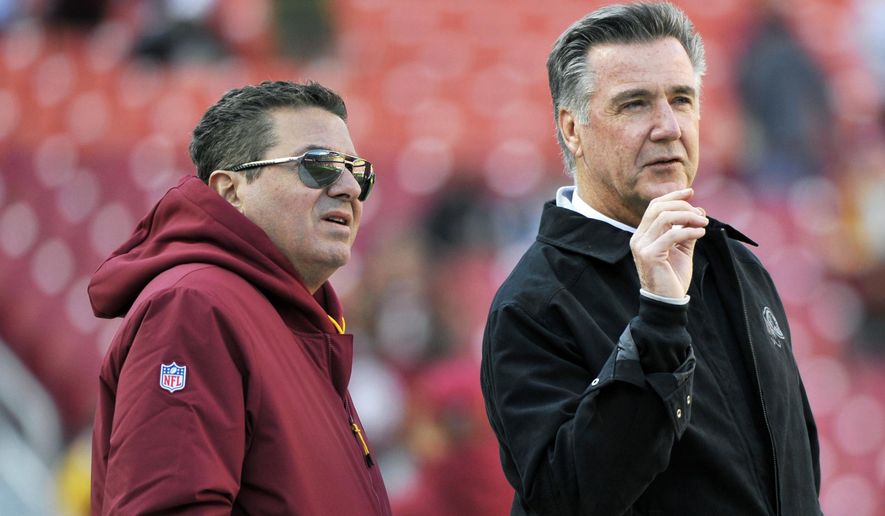Ron Rivera got some great news last week — the cancer that threatened his life is gone.
The Washington Football Team coach had been battling squamous cell carcinoma since the cancer was diagnosed in August and coached throughout the 2020 season while undergoing treatment for the disease.
In what was likely the most important victory of his life. Rivera was told he’d beaten the disease he had been living with, the one that sapped his strength and energy privately while he publicly spoke of winning and change.
But Rivera, despite being slowed by cancer, found the fortitude he needed to cobble together an NFC East title in his first season in Washington — and, at the same time, purge the organization of any last vestiges of the front office structure he inherited from the previous regime.
One of the holdovers from that regime, Kyle Smith, is out as Washington’s vice president of player personnel, leaving to take the same job with the Atlanta Falcons. Also gone, according to the Washington Post, are three scouts — director of pro personnel and advance coordinator Jeff Scott, national scout Cole Spencer and personnel coordinator and pro scout Brian Zeches.
Those departures rid the franchise of some of the remaining legacies of former boss Bruce Allen, while opening key positions for Rivera allies — allies the coach will need as he looks to combat the infection of ineptitude and dysfunction that has plagued Washington Football since Dan Snyder purchased the team in 1999.
Rivera added two key front-office executives, his former general manager in Carolina, Marty Hurney, and former Detroit Lions general manager and Washington Football cornerback Martin Mayhew. Hurney will take the role of executive vice president, while Mayhew will officially be the GM.
Their most important titles? Ron Rivera’s guys.
The balance of power in the Washington Football Team building has been out of whack for most of Snyder’s tenure, with everything tilted in favor of the owner.
It started in 1999, when the then-new owner immediately felt he needed to make a choice between general manager Charley Casserly and coach Norv Turner. Snyder chose Turner and fired Casserly, because, after all, Snyder couldn’t actually coach the team.
Then came Marty Schottenheimer, who drove Snyder’s puppet, Vinny Cerrato, from the building and ignored all the petty whims that emitted from the owner’s box. That lasted one season before Snyder pulled the plug and regained his power in the building, bringing back Vinny.
Steve Spurrier didn’t care so much about the players, as long as he could use his plays. Joe Gibbs should have been the exception, but he played the political game of keeping Snyder involved and tolerating, if not embracing, the meddling.
After Gibbs, it’s been Snyder and his lackeys, first Cerrato, then Allen, vs. the coach every year.
But for the first time really since Schottenheimer, Rivera has control in the building. Snyder still signs the checks, but his yes men are gone. He stands alone.
This is how you accrue power — power Rivera will need.
You hire guys who owe their jobs to you. Whether it’s football, baseball, whatever — if you hope to be in charge while fighting off the politics of front offices, you need people who owe their existence to you. That’s where the trust is.
Hurney and Mayhew owe their new gigs to Rivera, as many others who have arrived since he was hired. Jay Gruden had no such power. He couldn’t even pick all his assistant coaches. It was Snyder and Allen vs. Gruden. When Allen was forced to hire someone new in the mix — a general manager — he hired one he knew would self destruct in Scot McCloughan.
In the end, it didn’t matter how good Smith and the others were, or how much they would profess their loyalty to Rivera. Like Michael Corleone, Rivera, with whatever power a 7-9 NFC East division championship season gave him, took care of all family business.
Gruden, for one, sang Smith’s praises: “Every year that I was there, we had a pretty good draft class, with a couple exceptions,” the former Washington coach told the Post. “[Smith] was really good about listening to the coaches because the coaches also did evaluations.”
But what good did that do Gruden, when it came time to do battle with Snyder and Allen? “When it came our time to pick, we’d always talk about the picks, where we’d like to go, what happens if [the player] is gone, and did all our scenarios. And then Snyder would come off of his yacht and make the pick.”
Snyder is wounded like never before, in danger of losing the franchise as a result of an NFL investigation into charges of sexual harassment by 40 women, in addition to the publicly embarrassing fight with his minority partners.
Every time I write that figure — 40 — I find it difficult to imagine how the NFL could continue to let Snyder represent their league. But these are strange times, and if Snyder somehow survives all this, he may emerge to try to flex his muscles once more — only to see that the only person standing with him is his yacht captain.
Hear Thom Loverro on 106.7 The Fan and on The Kevin Sheehan Podcast.
• Thom Loverro can be reached at tloverro@washingtontimes.com.




Please read our comment policy before commenting.